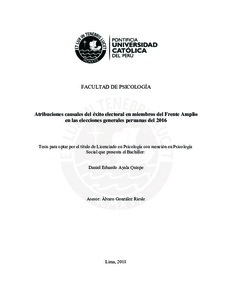| dc.contributor.advisor | González Riesle, Álvaro | es_ES |
| dc.contributor.author | Ayala Quispe, Daniel Eduardo | es_ES |
| dc.date.accessioned | 2018-11-08T21:27:15Z | es_ES |
| dc.date.available | 2018-11-08T21:27:15Z | es_ES |
| dc.date.created | 2018 | es_ES |
| dc.date.issued | 2018-11-08 | es_ES |
| dc.identifier.uri | http://hdl.handle.net/20.500.12404/12947 | |
| dc.description.abstract | El presente trabajo explora las atribuciones causales de éxito electoral en los integrantes del
Frente Amplio (FA) durante las elecciones generales. Para esto se realizaron entrevistas a
profundidad con 9 miembros de la coalición. Se identifican cuatro grandes grupos
explicativos para el éxito: causas vinculadas a la organización política, a la candidata
presidencial, a elementos en la coyuntura política y a la población. Estos bloques de sentido
se analizaron y categorizaron de acuerdo al modelo tridimensional, el cual contempla la
ubicación, el control y la estabilidad como dimensiones independientes y complementarias.
La sistematización de la información recopilada permite afirmar que el enfoque teórico de
Bernard Weiner ayuda a comprender los fenómenos políticos a nivel psicológico, puesto
que brinda una aproximación cognitiva, emocional y volitiva del problema. | es_ES |
| dc.description.abstract | This paper explores the causal attributions of electoral success in FA members during the
general elections of 2016. In-depth interviews were conducted with 9 coalition members.
Four major groups are identified for success: causes linked to the political organization, the
presidential candidacy, elements in the political situation and the population. These blocks
of meaning were analyzed and categorized according to the three-dimensional model,
which contemplates location, control and stability as independent and complementary
dimensions. The systematization of the collected information allows affirming that the
theoretical approach of Bernard Weiner helps to understand the political phenomena at the
psychological level, since it provides a cognitive, emotional and volitive approach of the
problem. | es_ES |
| dc.language.iso | spa | es_ES |
| dc.publisher | Pontificia Universidad Católica del Perú | es_ES |
| dc.rights | Atribución-NoComercial-SinDerivadas 2.5 Perú | * |
| dc.rights | info:eu-repo/semantics/openAccess | es_ES |
| dc.rights.uri | http://creativecommons.org/licenses/by-nc-nd/2.5/pe/ | * |
| dc.subject | Frente Amplio (Perú) | es_ES |
| dc.subject | Atribución (Psicología Social) | es_ES |
| dc.subject | Campaña electoral--Perú--2016 | es_ES |
| dc.title | Atribuciones causales del éxito electoral en miembros del Frente Amplio en las elecciones generales peruanas del 2016 | es_ES |
| dc.type | info:eu-repo/semantics/bachelorThesis | es_ES |
| thesis.degree.name | Licenciado en Psicología con mención en Psicología Social | es_ES |
| thesis.degree.level | Título Profesional | es_ES |
| thesis.degree.grantor | Pontificia Universidad Católica del Perú. Facultad de Psicología | es_ES |
| thesis.degree.discipline | Psicología con mención en Psicología Social | es_ES |
| renati.discipline | 313066 | es_ES |
| renati.level | https://purl.org/pe-repo/renati/level#tituloProfesional | es_ES |
| renati.type | http://purl.org/pe-repo/renati/type#tesis | es_ES |
| dc.publisher.country | PE | es_ES |
| dc.subject.ocde | https://purl.org/pe-repo/ocde/ford#5.01.00 | es_ES |






